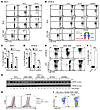Citation Information: J Clin Invest. 2017;127(5):1651-1663. https://doi.org/10.1172/JCI89931.
Abstract
Mature B cell pools retain a substantial proportion of polyreactive and self-reactive clonotypes, suggesting that activation checkpoints exist to reduce the initiation of autoreactive B cell responses. Here, we have described a relationship among the B cell receptor (BCR), TLR9, and cytokine signals that regulate B cell responses to DNA-containing antigens. In both mouse and human B cells, BCR ligands that deliver a TLR9 agonist induce an initial proliferative burst that is followed by apoptotic death. The latter mechanism involves p38-dependent G1 cell-cycle arrest and subsequent intrinsic mitochondrial apoptosis and is shared by all preimmune murine B cell subsets and CD27– human B cells. Survival or costimulatory signals rescue B cells from this fate, but the outcome varies depending on the signals involved. B lymphocyte stimulator (BLyS) engenders survival and antibody secretion, whereas CD40 costimulation with IL-21 or IFN-γ promotes a T-bet+ B cell phenotype. Finally, in vivo immunization studies revealed that when protein antigens are conjugated with DNA, the humoral immune response is blunted and acquires features associated with T-bet+ B cell differentiation. We propose that this mechanism integrating BCR, TLR9, and cytokine signals provides a peripheral checkpoint for DNA-containing antigens that, if circumvented by survival and differentiative cues, yields B cells with the autoimmune-associated T-bet+ phenotype.
Authors
Vishal J. Sindhava, Michael A. Oropallo, Krishna Moody, Martin Naradikian, Lauren E. Higdon, Lin Zhou, Arpita Myles, Nathaniel Green, Kerstin Nündel, William Stohl, Amanda M. Schmidt, Wei Cao, Stephanie Dorta-Estremera, Taku Kambayashi, Ann Marshak-Rothstein, Michael P. Cancro
This file is in Adobe Acrobat (PDF) format. If you have not installed and configured the Adobe Acrobat Reader on your system.
Having trouble reading a PDF?
PDFs are designed to be printed out and read, but if you prefer to read them online, you may find it easier if you increase the view size to 125%.
Having trouble saving a PDF?
Many versions of the free Acrobat Reader do not allow Save. You must instead save the PDF from the JCI Online page you downloaded it from. PC users: Right-click on the Download link and choose the option that says something like "Save Link As...". Mac users should hold the mouse button down on the link to get these same options.
Having trouble printing a PDF?
- Try printing one page at a time or to a newer printer.
- Try saving the file to disk before printing rather than opening it "on the fly." This requires that you configure your browser to "Save" rather than "Launch Application" for the file type "application/pdf", and can usually be done in the "Helper Applications" options.
- Make sure you are using the latest version of Adobe's Acrobat Reader.
Supplemental data - Download (474.91 KB)



Copyright © 2025 American Society for Clinical Investigation
ISSN: 0021-9738 (print), 1558-8238 (online)

